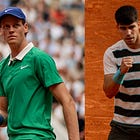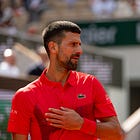Understanding Novak Djokovic in This Moment
After another tough loss at Wimbledon, Novak Djokovic spoke revealingly in both English and (translated) Serbian.
WIMBLEDON, England — Carlos Alcaraz took an unusually long time coming to press after winning the first men’s singles semifinal in four sets on Friday at Wimbledon.
With Alcaraz dilly-dallying, it appeared Novak Djokovic, who suffered had a decisive 6-3, 6-3, 6-4 defeat in just an hour and 55 minutes in the ensuing second semifinal, would actually leapfrog ahead of the expected order and make it into the interview room before Alcaraz.
When Djokovic was announced as an imminent arrival, the media theatre filled up more than it ever had before, with nearly every jade-green vegan leather seat occupied.
But with the room full for Djokovic—and whatever the 38-year-old, 24-time major champion might reveal about his precarious future—it was then announced that, actually, Alcaraz would be arriving first. Alcaraz rarely disappoints a crowd, but there was an audible sigh from some of the gathered right before the two-time defending champion walked in.
Even though Alcaraz is going for a third consecutive Wimbledon title on Sunday, his jaw dropped when he walked in and saw the unusually large crowd in the media theatre.
“Wow!” Alcaraz exclaimed as he made his way to the podium. “It’s full today, eh? I haven’t seen it that full. Thank you, I guess?”
Alcaraz had a lot he could discuss: he’s set for a big Wimbledon final on Sunday against Jannik Sinner, an immediate rematch of their French Open final which earned a spot in the all-time classics conversation.
“The things that we are doing right now, I think it’s great for tennis,” Alcaraz said of himself and Sinner.
An Alcaraz-Sinner Slam final sequel is indeed hugely exciting for men’s tennis, but a good chunk of the reporters had packed into the room not for Alcaraz, but for Djokovic, who has now lost all three major semifinals he’s played this year without winning a set.1
Because as clear as it is that a new Alcaraz/Sinner chapter has begun in men’s tennis now that it’s guaranteed that they will have split seven major titles in a row, it’s equally clear that the unprecedented Big Three era of dominance—or even competitive relevance at the business end of majors—looks almost certainly over.
As Changeover author Giri Nathan said in our conversation about Sinner and Alcaraz before their French Open final: “The era that they were ushering in is—the ushering is over; we're just in it. We're in it right now.”
Novak Djokovic, Head On
Once Alcaraz had finished the English and Spanish sections of his press conference, Djokovic strolled in, sat down, and asked for the questions to come at him right away without making any opening remarks.
After leaving his future as an open question in Paris, this occasion seemed high stakes once more: after falling short again, might this additional defeat cause Djokovic to make a clear pronouncement about his future?
The first question regarded the clear physical impairment Djokovic showed during and after the match, when his wave to the crowd while departing was accompanied by a noticeably slow shuffle.

“Quite a bit, honestly,” Djokovic said. “Wasn't really a pleasant feeling on the court. Yeah, I don't want to talk, in details, about my injury and just whine about not managing to play my best. I want to congratulate Jannik for another great performance. That's it. He's in the finals. He was too strong. I do feel, yeah, disappointed that I just wasn't able to move as well as I thought or hoped that I would.”
Djokovic, often fatalistic in defeat, then rejected the premise of the next question, that suggested he had been “unfortunate at big moments.”
I don't think it's bad fortune; it's just age, the wear and tear of the body, as much as I'm taking care of it,” Djokovic, 38, said. “The reality hits me right now, last year and a half, like never before, to be honest. It's tough for me to accept that because I feel like when I'm fresh, when I'm fit, I can still play really good tennis. I've proven that this year.”
But Djokovic wasn’t avoiding the evident.
“But yeah, I guess playing best-of-five, particularly this year, has been a real struggle for me physically,” he said. “The longer the tournament goes, yeah, the worse the condition gets. I reach the final stages, I reach the semis of every slam this year, but I have to play Sinner or Alcaraz. These guys are fit, young, sharp. I feel like I'm going into the match with tank half empty. It's just not possible to win a match like that. It is what it is, you know? It's one of these things I accept and embrace in some way, deal with the reality the way it is, and try to make the most out of it, I guess.”
Would Djokovic be sad, he was asked, “if that were your last match on Centre Court, to go off like that?”
This time, though, Djokovic sounded at least temporarily clearer about his future than he had in Paris.
“I would be sad, but hopefully it's not my last match on the Centre Court,” Djokovic said. “I'm not planning to finish my Wimbledon career today. So I'm planning to come back definitely at least one more time, to play on the Centre Court, for sure.”
In his next answer, Djokovic said he would go back to the drawing board to figure out if he could chart a new course, to discover a new way of mountaineering back to the summit of the sport against increasingly steep odds.
“Yeah, I probably have to revisit everything and see with my team, with my family, how I want to proceed with my schedule and where I want to peak and how I want to train,” Djokovic said. “I don't know what I can do differently, to be honest, because the amount of hours that I spend on a daily basis to take care of myself—I'd like to challenge everyone who is out there on the tour to see if anybody takes cares of themselves more than me. And I, unfortunately, don't get rewarded for that right now, with injuries at the later stages of Slams.”
But even in defeat, Djokovic didn’t allow himself to indulge in even momentary bitterness.
“But I was rewarded, for many, many years,” Djokovic added. “I might see it right now as a misfortune, but I have gotten so much from God and the life in my career that it would be a disservice really from me to God and to my body and to everything that I had in my career to start complaining about injuries, because I've been fit for so long and had an incredible career, so.
“I'm just trying to make, I guess, the maximum out of what I have left. Again, I just got off the court, so of course, I'm upset and disappointed, mostly not for the loss, because obviously even if I was fit, I wasn't a favorite to win against Sinner, I know that, but I think I had good chances if I was fit. But it's just that physical aspect that is bothering me. You're there. You want to play. You're determined. But then the body doesn't want to listen. That's it. That's what you can say about it.”
Found in Translation
As Djokovic’s brief third set lead was slipping away from him, ESPN showed a clip of Djokovic shouting toward his box during a changeover. ESPN had showed the clip even though all in the production team were apparently clueless about the actual content of his words.
“Many times in the last 20 years I wish I spoke Serbian,” Chris Fowler said after the clip played.
“Exactly,” Patrick McEnroe said, laughing. “Where’s our Serbian translator?”
ESPN’s commentators were making light of their decades-long ignorance of what Djokovic has been saying on court, but I think they can and should do better for their viewers. Millions of people speak both Serbian and English fluently and could be easily hired as translators during his matches. This is hardly beyond ESPN’s capabilities.
I feel especially comfortable calling this out because, even on my considerably-smaller-than-ESPN budget here at Bounces, I have invested in translating the Serbian portion of Djokovic’s post-loss press conferences for two majors in a row now. I did it in Paris, and now I am doing it again today from his press conferences at Wimbledon.
“I’ve had twenty-plus years of a top-level career. I’ve broken every possible record. So yes, I have some bitterness in me at this moment because I’ve just lost, but in the bigger picture, of course I feel more gratitude than disappointment.” -Novak Djokovic on Friday, translated from Serbian
So for Bounces subscribers, below the following paywall you’ll find the Serbian portion of Djokovic’s press conference, exclusively translated by a professional Serbian-English translator for Bounces. This is a pivotal moment in the career of the winningest guy in tennis history, and I thought it was worth telling the story of this moment for y’all as fully as I possibly could.
Thanks for reading Bounces! Please join us for the Wimbledon finals live chats on Saturday and Sunday, and enjoy the translated Serbian below! -Ben








